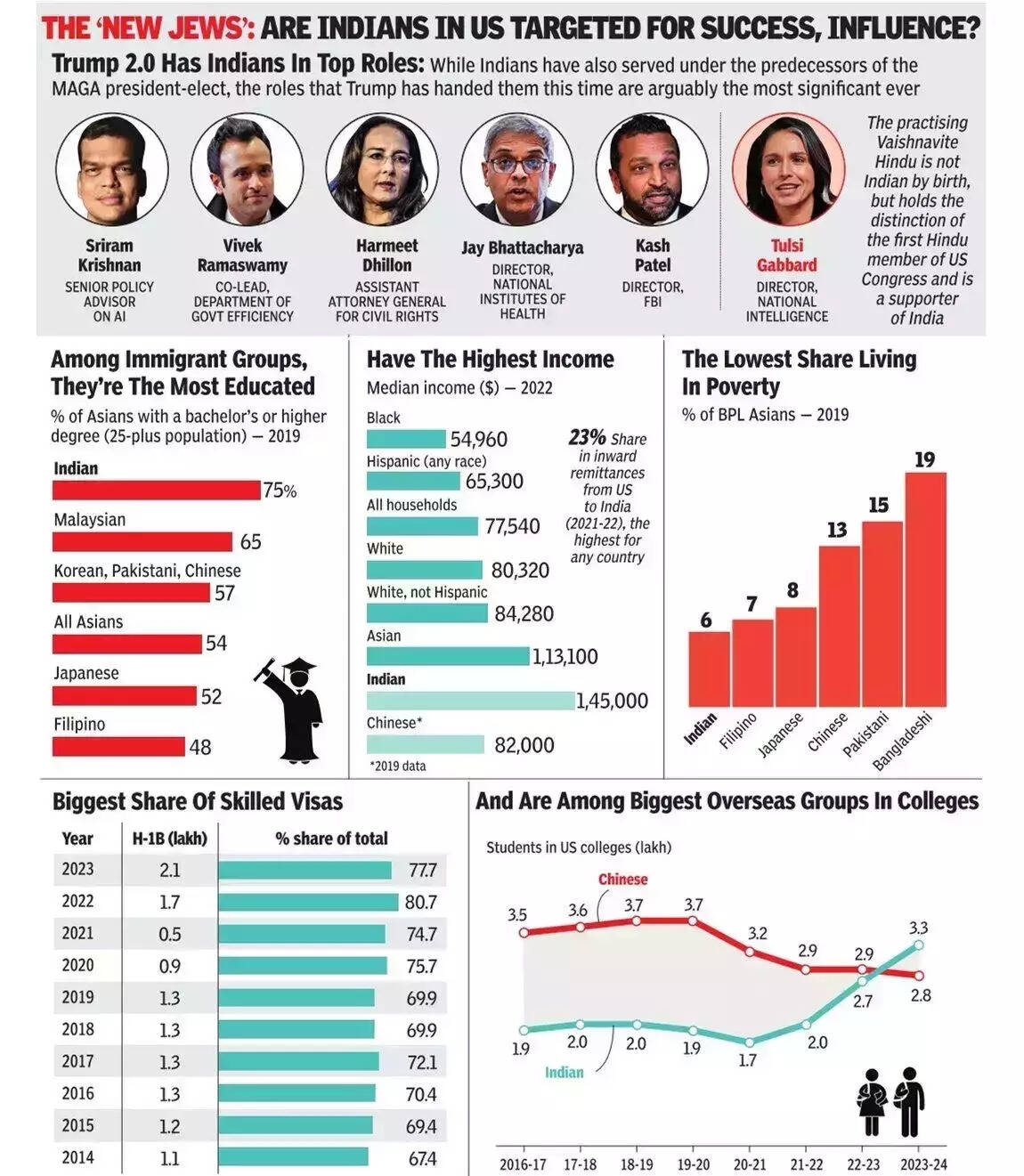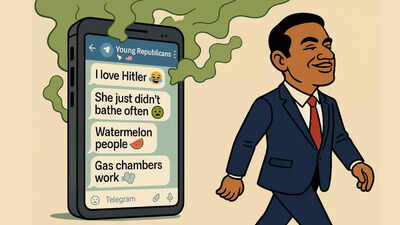When Kamala Harris was announced as the Democratic presidential candidate after Joe Biden stepped down — or was pushed aside — the joke in the vast Indian-American community was that the upcoming election was now a Telugu vs Tamil fight. While Harris was repping Tamil Nadu, JD Vance was obviously the Andhra candidate with a Telugu wife.Levity aside, many commentators saw this as a sign of how far the Indian community — once reduced to Apu jokes or stereotypical bit parts in Bollywood movies — had come to being front and centre in American politics. Vivek Ramaswamy was a presidential contender, as was former US Ambassador to the UN Nikki Haley.During the election, fewer Indian-Americans voted for Harris than they did for Democratic candidates like Biden, Clinton, or Obama. Even after the election, it appeared Indians were everywhere and integral to the Republican machine. Tulsi Gabbard, an honorary Indian, was now Director of National Intelligence. Sriram Krishnan was advising Trump on AI. Kash Patel was the FBI chief. But all of it appeared to be just veneer, and the contempt for the community continued unabated — as evident during the MAGA Civil War, when the faithful attacked H-1B visa holders (mostly Indian-Americans) for Americans losing their jobs.But it went far beyond social media outrage — and the hate has gone offline as well.
The Chat That Tore the Veneer Off

President Donald Trump speaks during an event in the Oval Office at the White House, Wednesday, Oct. 15, 2025, in Washington, as FBI director Kash Patel listens. (AP Photo/John McDonnell)
In October 2025, Politico published over 2,900 pages of leaked Telegram chat logs from the Young Republican National Federation — the so-called “farm team” of the GOP, home to the party’s next generation of strategists, staffers, and would-be senators.The content was revolting. Members joked about Hitler (“I love Hitler”), fantasised about gassing opponents, called the mass rape of Indigenous women “epic,” and cheered for slavery. Black people were “watermelon people.” Jews were “sneaky.” Asians were “ch–ks.” Women were raped and laughed about. The “n-word” appeared in dozens of variations.This wasn’t an anonymous 4chan sewer or a forgotten Discord channel. It was a closed group of politically ambitious Republicans — state chairs, campaign aides, legislative staffers — including a sitting Vermont senator, Samuel Douglass. They knew full well that exposure would destroy them. One even warned: “If we ever had a leak of this chat, we would be cooked fr fr.” And yet they “kept typing away” anyway.“She Just Didn’t Bathe Often”Amid the torrent of hatred, one particular exchange stood out for its precision — not because it was more vile than the rest, but because it revealed something deeper about how Indian-Americans are seen inside the Republican base.“He dated this very obese Indian woman for a period of time.” The comment came from Bobby Walker, vice chair of the New York Young Republicans. It wasn’t about ideology or policy. It was simply an ethnic insult masquerading as gossip.Peter Giunta, the group’s chair, interjected to clarify that the woman “was not Indian.” To which Samuel Douglass — a sitting state senator — delivered the punchline: “She just didn’t bathe often.”The joke was as old as colonial racism itself. Indians, reduced to a smell. Brownness, conflated with filth. It wasn’t even about the woman — an acquaintance with no public role — but about the idea of Indianness as inherently dirty.No one objected. No one cautioned restraint. The remark passed as acceptable humour in a space where Black people were animals, Jews were dishonest, and immigrants were parasites.This was the Republican Party’s next generation — and for them, Indians were still a punchline.
The Deeper Truth: Inclusion Without Acceptance
That throwaway “bathing” joke is more revealing than it appears. It punctures the illusion that representation equals respect. Indian-Americans may have made it to the highest rungs of Republican politics — but they haven’t made it inside the room.On the surface, the GOP is awash with brown faces. Vivek Ramaswamy isn’t just tolerated; he’s celebrated as the embodiment of meritocratic immigration. Kash Patel isn’t merely accepted; he’s tasked with dismantling the deep state. Sriram Krishnan is entrusted with shaping the administration’s AI policy.Yet beneath the photo-ops and appointments, contempt simmers. Because to many in the MAGA base, the Indian ascent is tolerated, not welcomed — conditional, not complete. They are useful, but not “us.”The same community that cheers Patel’s crackdown on fentanyl traffickers or Gabbard’s hawkish foreign policy still rails against H-1B visa holders for “stealing jobs.” The same base that retweets Ramaswamy’s tirades against “wokeism” also complains that Indian CEOs “control too much of Silicon Valley.”This is not hypocrisy. It’s hierarchy. You can rise within the machine — but you must know your place inside it.The deeper resentment stems from a familiar cultural anxiety. Indian-Americans today are where Jewish-Americans were a century ago: disproportionately successful, highly networked, overrepresented in elite institutions — and therefore, inevitably, resented.The numbers speak for themselves. Over 75% of Indian-Americans hold a bachelor’s degree or higher. Their median household income is nearly double the national average. They run Google, Microsoft, Adobe, IBM. They lead Harvard Business School, Chicago Booth, and the Federal Reserve Bank of Dallas.It is precisely this success that provokes discomfort among those who see themselves as the rightful heirs of American power. The MAGA movement is rooted in a story about decline — a belief that “real” Americans have been displaced by immigrants, globalists, and elites. And Indian-Americans, with their Ivy League degrees and trillion-dollar companies, are the most visible avatars of that displacement.So when jobs disappear, it’s not automation or corporate greed that gets blamed — it’s the Indian engineer on an H-1B visa. When housing prices rise, it’s not Wall Street’s speculation — it’s the “IT guy from Hyderabad” buying in the suburbs. In this narrative, every success story is an insult. Every achievement is a provocation.
The Politics of Transgression
That resentment is what makes the Young Republicans’ chat so instructive. Their use of slurs was not random. It was ritual. It wasn’t just hatred; it was hierarchy, rehearsed and reinforced.The “bathing” joke wasn’t about one woman. It was a way to reassert the idea that no matter how successful Indians become, they remain “other” — a people to be mocked, not respected.The mechanics of it are familiar. A private group provides plausible deniability. Offensive jokes become acts of rebellion against “political correctness.” Each insult is a loyalty test — laugh or be cast out. And ambiguity offers an escape hatch: we didn’t mean it, we were just joking.This is the “strategic ambiguity” Katherine Dee calls the defining feature of online extremism. When every hateful remark can be dismissed as irony, the boundary between belief and performance collapses. What begins as trolling often hardens into ideology. And even when it doesn’t, the effect is the same: it normalises prejudice.
Digital Poison, Real-World Consequences
The internet accelerates this process. Behind a screen, the usual brakes — shame, empathy, accountability — fail. Typing a slur is easier than saying one aloud. Sharing a meme requires no courage.But words typed in darkness rarely stay there. Memes travel. Jokes metastasise into narratives. And when they are repeated often enough, they reshape what people believe to be normal.The Young Republicans thought their chat was a safe space. They were wrong. And when Politico made it public, the consequences were swift. Careers ended. State chapters disbanded. Even national leaders condemned the rhetoric as “vile.”Yet even then, the minimisers emerged. Vice President JD Vance dismissed the messages as “stupid jokes” from “kids.” Others warned against “joining the left’s pile-on.” The instinct to protect one’s own — even when “one’s own” jokes about gas chambers — remains powerful.This reflex matters because it tells the next generation that they can say the same things and survive. It ensures that the contempt behind the “bathing” joke will not be confined to one Telegram thread. It will seep into campaign offices, congressional hearings, and White House policy debates — unless it is stopped.
The New Jews — and the Old Bigotry

In many ways, Indian-Americans have become what Jewish-Americans once were: a community that thrives despite suspicion, excels despite resentment, and is mocked precisely because it succeeds.They are the “new Jews” of America’s cultural imagination — indispensable yet resented, celebrated yet stereotyped. Their children dominate spelling bees, but their names are punchlines. They run trillion-dollar companies, but their hygiene is fair game.The tragedy — and perhaps the irony — is that many Indian-Americans still believe that political proximity will insulate them from prejudice. That serving as FBI director or Surgeon General will erase centuries of racial contempt. The Young Republicans’ chat is a brutal reminder that proximity does not equal acceptance.Representation is not the same as respect. And power does not always protect you from ridicule.There is a temptation to dismiss the “obese Indian woman” remark as juvenile stupidity — the digital equivalent of a high school locker-room taunt. That would be a mistake. Because it is precisely in these private, “joking” spaces that public prejudice is born.The Republican Party is not uniquely guilty of this — but it is uniquely vulnerable to it. A movement that defines itself in opposition to “wokeism” will always flirt with transgression for transgression’s sake. And as the Telegram chats show, transgression has a way of metastasising into hate.For Indian-Americans, the lesson is harsher still. The arc of their story — from Apu jokes to the FBI director’s office — is extraordinary. But their success has not bought them immunity. They remain, in the eyes of many in the movement they now help lead, outsiders. And as long as that is true, every triumph will come with an asterisk.The leaked chats of the Young Republican National Federation should not be read as an aberration. They are a mirror — a brutally honest one — reflecting the gap between the GOP’s public embrace of Indian talent and its private disdain for Indian identity.It is possible for a party to elevate Usha Vance to the role of Second Lady and still sneer at an “obese Indian woman” in a private conversation. It is possible to praise merit-based immigration in public and mock H-1B visa holders online. And it is possible to rely on Indian-American billionaires for campaign donations while laughing at their supposed smell behind closed doors.That is the paradox of Indian power in America today: unprecedented in scope, yet fragile in acceptance. And until that changes, the real test of belonging will not be in the cabinet appointments or campaign rallies — it will be in the private spaces where jokes are made and no one dares to object.







